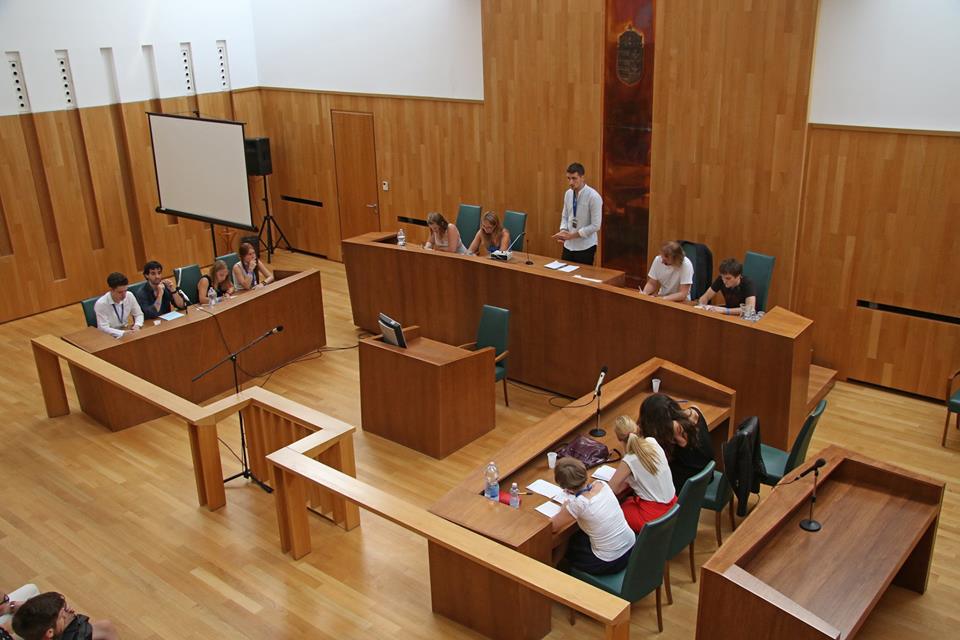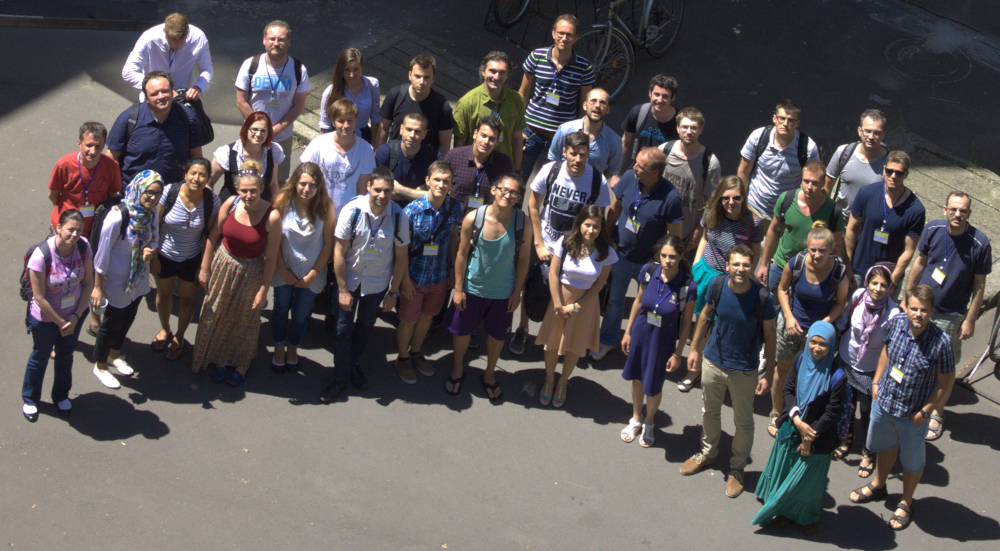
In summer 2016, five international summer universities were organised under the CEEPUS programme. The students and teachers, most of them from Central Europe and the Western Balkans, gathered in Budapest, Eger, Gödöllő, Pécs and Szeged, to join their Hungarian peers in courses addressing various areas.
History of Mathematics
The Institute of Mathematics and Informatics of the Department of Sciences at Eszterházy Károly University organised its summer university focusing on the Central European aspects of the history of mathematics. Course organiser Dr. Tibor Juhász, College Associate Professor, told us about the insights.
"Eszterházy Károly University has only been a member of the CEEPUS network for hardly more than a year, so we're particularly happy that we were given the opportunity to organise a summer university so soon.
During the course, our university held a conference on the history and teaching of mathematics, the Chairman of which was Edmund Robertson, one of the creators of the most well-known database in the subject, the MacTutor History of Mathematics Archive, and Hirst Prize winner Professor Emeritus at St. Andrews University. We intentionally chose the course period to coincide with the three professional days of the conference. This way we could ensure our students an extraordinary opportunity to learn from recognised professionals. At the conference, perhaps the most successful lecture was given by Dirk Huylebrouck. The subject itself was a winning choice: in his lecture he discussed the mistakes found in Leonardo da Vinci's geometry-related works. And that was further enhanced by Dirk’s suggestive style.
During the days that followed the conference, the lectures were discussed and conclusions drawn in an interactive manner. Throughout this work, great emphasis was laid on personal consultation between the students and teachers of the course and the participants of the simultaneous conference.
At universities, a history of mathematics course – if available at all – normally means a two-hour lecture weekly, for one semester. The participants of our intensive course could acquire many times the knowledge available at these courses, spiced up with the latest research findings.
At the course, everything went as expected, and our efforts put into the organisation work were fully compensated for by the smiles on the faces and the feedback we got during the days after closing the course."
CEEPUS network: CIII-HU-0028-09-1516 Active Methods in Teaching and Learning Mathematics and Informatics
Participants: 30 students and 26 teachers
Albania, Australia, Belgium, Bulgaria, the Czech Republic, UK, Greece, Croatia, Iran, Romania, Serbia, Slovakia and Hungary
Green Printing and Packaging
 At the summer university organised by the Institute of Media Technology at the Rejtő Sándor Faculty of Light Industry and Environmental Protection Engineering at Óbuda University the participants focused on the environmental aspects of printed engineering communication and designing. Course organiser Dr. Rozália Szentgyörgyvölgyi, Associate Professor, told us about the insights.
At the summer university organised by the Institute of Media Technology at the Rejtő Sándor Faculty of Light Industry and Environmental Protection Engineering at Óbuda University the participants focused on the environmental aspects of printed engineering communication and designing. Course organiser Dr. Rozália Szentgyörgyvölgyi, Associate Professor, told us about the insights.
"When designing the programme, we concentrated on the strengths of the participating institutions, the teachers from the guest schools held lectures on this field, so the course offered mutual benefits for all partners.
The programme laid special emphasis on the characteristics of the economic environment of the European media industry and environmental protection. The students involved could monitor the various stages of each media product, from planning to implementation, with a special focus on the environmental aspects. They studied the possibilities to solve and apply in practice various issues of the media industry and environmental protection. The outcomes of the project work were tangible, printed products (posters).
Practical work was done in teams in a multimedia laboratory, with the attendance of 4-4 students each, from different countries. The students liked the project work conducted in international teams, because they had a chance to learn the material in a foreign language. Manual papermaking and screening was also a great success; here they could use what they'd learnt, as well as their creativity."
CEEPUS network: CIII-RS-0704-04-1516 Research and Education in the Field of Graphic Engineering and Design
Participants: 15 students and 9 teachers
Croatia, Poland, Slovenia and Hungary
Debate Academy on the Migration Crisis
 The Department of Political Science and International Studies at the Faculty of Arts of the University of Pécs has organised its summer course called ‘Debate Academy’ for many times now. This year’s programme focused on the issue of global migration, which was also open to a number of participants from the department's CEEPUS network partners. Course organisers Dr. Andrea Schmidt, Senior Lecturer and Dr. István Tarrósy, Associate Professor, told us about the insights.
The Department of Political Science and International Studies at the Faculty of Arts of the University of Pécs has organised its summer course called ‘Debate Academy’ for many times now. This year’s programme focused on the issue of global migration, which was also open to a number of participants from the department's CEEPUS network partners. Course organisers Dr. Andrea Schmidt, Senior Lecturer and Dr. István Tarrósy, Associate Professor, told us about the insights.
"Our CEEPUS network called 'Europe in the Visegrad Perspective' lays special emphasis on organising courses focusing on the region, covering issues of social and political culture, the culture of political science, as well as those of international economic embeddedness. Our summer university also focused on this region, addressing the challenges of migration. The guest lecturers approached the issue from various angles, with equal focus on the challenges of political geography, political culture, intercultural relations and security policy.
At the conventional lectures, the participants mostly gained factual knowledge, that is, they learnt about political geography, intercultural dialogue, how prejudices change over time and their effects, as well as historical and cultural components. Later they discussed the topics in a manner resembling British parliamentary debates. It allowed participants to give 5 to 7-minute-long speeches, for which they prepared with the help of trainers. The final debate day had been organised for the third time, with support from the Municipal Court of Pécs.
Note that one of our Serbian participants made a very detailed documentation of the programme, not only images, but also videos, which he instantly uploaded to his YouTube channel, so it's also become a kind of personal diary of the summer university.
The success of the programme proves that the attending students left with positive feelings, whereas we, organisers with an experience which we can as well rely on in the future."
CEEPUS network: CIII-PL-0815-03-1516 Europe in the Visegrad Perspective
Participants: 39 students and 10 teachers
France, Netherlands, Croatia, China, Poland, Italy, Serbia, Turkey, Chile and Hungary
Fish Breeding
The Department of Aquaculture at the Institute of Aquaculture and Environmental Safety of Szent István University organised a summer university within its nearly 16-year-old CEEPUS network, focusing on the latest research findings of fish breeding. Course organisers Dr. Zsuzsanna Tarr, Head of International and Foreign Relations Office and Dr. Müllerné Dr. Magdolna Trenovszki, Technical Assistant, told us about the insights.
“In aquaculture and freshwater fish farming, the areas where molecular biology, biotechnology and genetics play a significant role are gaining importance. In this field, Hungary has a leading position in technological innovation, and therefore the course provided students with up-to-date theoretical knowledge, and allowed them to learn about the most important biological, biotechnological and genetic methods, as well as the opportunities of breeding applications and uses related closely to the subject.
Students attended theory lectures and practical laboratory demonstrations, and were even given some tasks in certain laboratories, so they could personally try the laboratory equipment. One day they went on a field trip to visit the Hunting Museum of Hatvan. One of the leaders of a Maltese aquaculture company gave a video lecture about the latest research findings of European aquaculture, and then showed the audience the company’s recirculating systems.
The lectures given included ones that provided more general, complex information, analysing global and European trends, identifying the directions and problems of development or focusing on the useful microorganisms of water environments, whereas other lectures were very particular, such as the ones about the breeding and spawn production of predatory fish or deep-freezing fish semen, and there was even a histological sample analysis practice.
The funniest moment of the summer university was when the students had a chance to hold the slimy live fish, such as eel, carp and African catfish, in their hands.
Besides learning theory and practice, we should also highlight the building of international relations. An intensive international programme like this goes far beyond the limits of the course, both is space and time. Just to give one example: during the summer university, a Croatian and Hungarian TéT project was agreed on with three Croatian participants, and also submitted at the end of summer.
The insights and outcomes of the summer university can definitely be integrated into the future work of the network, the teachers and students who participated can return to us through individual mobility, but we can also visit our partners for guest lectures, our we may as well enter into joint supervision or research."
CEEPUS network: CIII-HU-0003-11-1516 @groen, Agriculture and Environment in the 21st Century
Participants: 16 students and 20 teachers (out of which 7 were supported by CEEPUS)
Austria, Bosnia and Herzegovina, Croatia, Poland, Montenegro, Serbia
Digital Image Processing
 The summer university organised by the Department of Image Processing and Computer Graphics at the Faculty of Science and Informatics of the University of Szeged focused on issues and challenges in the field of digital image processing. Course organiser Dr. Antal Nagy, Senior Lecturer, told us about the insights.
The summer university organised by the Department of Image Processing and Computer Graphics at the Faculty of Science and Informatics of the University of Szeged focused on issues and challenges in the field of digital image processing. Course organiser Dr. Antal Nagy, Senior Lecturer, told us about the insights.
„Our summer university is an annual meeting for students interested in digital image processing and teachers of the related subjects.
The University had hosted the event – which has now a history of 24 years – for the 12th time. Our goals haven’t changed, and the programme of the summer school is also based on a structure which has worked fine for many years. During the morning sessions, the participants can attend lectures, whereas in the afternoon they do project team work under the supervision of teachers.
The CEEPUS funding allowed students studying in the region (altogether half of all students) to attend the event.
Besides the programme of the summer school, the students could make new friends, learn about each other’s work and exchange experiences. I think that, besides the professional goals, it’s a very important outcome of the summer school.
According to the plans, our Serbian partner institution will organise the event in Novi Sad next year. In the following two years Graz and Timisoara, respectively, will host the summer school.”
CEEPUS network: CIII-AT-0042-11-1516 Summer School on Image Processing 2016
Participants: 32 students and 18 teachers
Austria, Belgium, Finland, France, Croatia, Poland, Morocco, Montenegro, Germany, Norway, Russia, Romania, Switzerland, Sweden, Serbia, Turkey and Hungary.
Last modified: 19-06-2019















